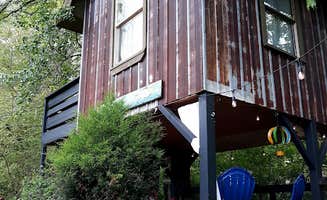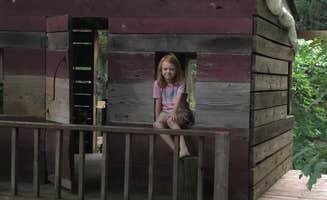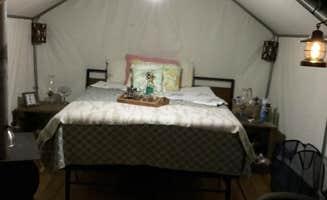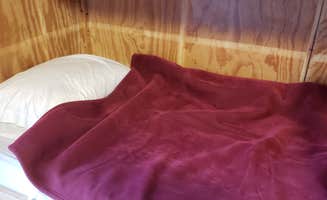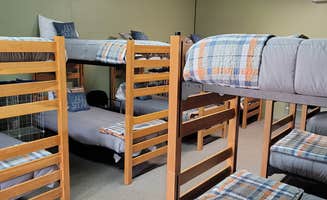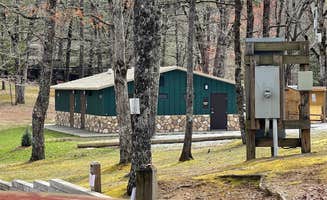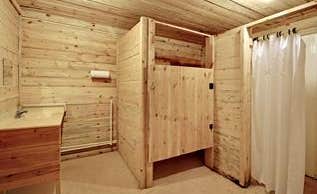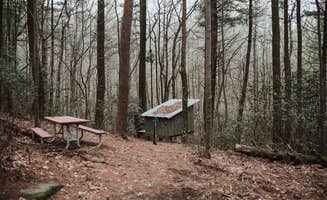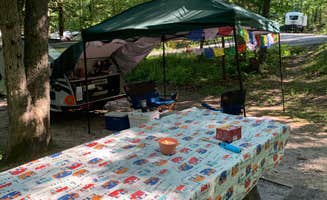Camping options near Blue Ridge, Georgia include established campgrounds in the Chattahoochee National Forest and privately owned facilities at elevations between 1,800-3,000 feet. Winter temperatures average 28-45°F while summer brings 65-85°F with moderate humidity. Most campgrounds remain accessible from April through November, though several stay open year-round with limited amenities during winter months.
What to do
Hiking to waterfalls: At Amicalola Falls State Park Camping, explore Georgia's tallest waterfall at 730 feet. "The hiking trails are amazing. The falls are beautiful. It was very busy parking was a bit of a challenge but worth it," notes Holly B. The moderate hike includes 400+ steps from base to top.
Lake activities: Morganton Point Campground offers swimming, fishing and paddling on Lake Blue Ridge. "We were on lot 14 which was quite spacious with easy access to the water. Tent was located away from the fire pit and picnic table and the restrooms were close by," reports Tia K. Kayak and paddleboard rentals cost $35 per craft at the beachside location.
Mountain biking: Multiple technical trails await at Fort Mountain State Park. "The trails are not blazed. We suggest everyone wear a helmet not just the required 16 years and younger group," advises Travyl Couple. Most trails include significant elevation changes on loose gravel surfaces requiring intermediate skills.
What campers like
Private tent sites: Vogel State Park Campground features walk-in tent sites in secluded settings. "We choose the walk in as the parking was still really close but there are only two of these sites. The creek runs right next to them and it was so peaceful and beautiful," shares Angela M. Sites cost $30 nightly.
Creekside camping: At Mulky Campground, sites sit alongside flowing water. "The camp spots are spacious and covered with tree canopies. You have a stream right by you no matter where you camp," explains Savannah C. Sites feature gravel tent pads with surrounding trees suitable for hammocks.
Wildlife viewing: Bears frequent some campgrounds in the region. "We had bear visitors, something they'll warn you about upon arrival. The bears just added to the appeal of this place though," reports Shelly C. about her Fort Mountain State Park experience. Bear-proof storage boxes are provided at some campsites.
What you should know
Road conditions: Reaching Chilhowee Recreation Area requires navigating steep terrain. "To get to this campground you have to go up a steep narrow windy mountain road," warns Carissa D. Similar access challenges exist at several Blue Ridge area campgrounds, making arrival during daylight hours advisable.
Site preparation: Many campgrounds have challenging terrain. "In most advertisements, the phrase 'one of the oldest and most beloved state parks' is used and frankly, I see why. I thoroughly enjoyed my stay," shares Dave V. about Vogel State Park, though noting "the ground was hard & pretty level. Make sure you have solid tent spikes."
Limited connectivity: Cell service varies dramatically by campground and carrier. "There is NO AT&T in spite of what this site says. You may get a weak signal on the other side, but it's spotty at best. There appeared to be a Verizon tower on the mountain, so that will probably work," reports Mike N. about Chilhowee.
Tips for camping with families
Winter camping options: Unicoi State Park & Lodge remains open year-round. "Stayed Feb 19th till 21st. Great well kept campground with clean bath houses. Our site was right on the creek," shares Jennifer. Winter camping typically costs 10-20% less than peak season rates.
Playground access: Many parks offer designated play areas. "My kids and I went camping at Unicoi Park in the summer and there is plenty to keep them busy. They played in the creek, on the swing set and walked the trail to the swimming section of the lake," reports Diane G. Fort Mountain State Park also features a playground near the lake area.
Educational opportunities: Several campgrounds offer learning experiences. "One of the best campgrounds, hands down. As an Eagle Scout from around this area, this was our go-to place for summer camp and occasional other camping trips as well," notes Ethan about Camp Woodruff. Some parks offer ranger-led programs during summer months.
Tips from RVers
Site selection challenges: At Trackrock Campground & Cabins, maneuvering requires careful planning. "We were recommended to stay at site 25 by the worker at check in. Very steep and unlevel roads; especially when leaving," warns Anthony M., who experienced equipment damage with his fifth wheel. Request detailed site information before booking.
Electrical limitations: Many campgrounds offer only limited power. "We had one outlet and water, a picnic table and a firepit. After setting up around 8 pm we cooled off by the fire. Our ac has its own plug, and there was nowhere to plug it in," reports Karen R. about Trackrock. Bring power adapters and extension cords for most sites.
Dump station access: At Fort Mountain State Park, RVers note varying dump station experiences. "From the B loop, you have to traverse about a 120 degree switchback to get to it. My friend who was there pulling a 5th wheel decided not to try it and opted to pay to dump somewhere else," shares Mike N., though adding "Once there, it was probably the best dump station I've ever used."


